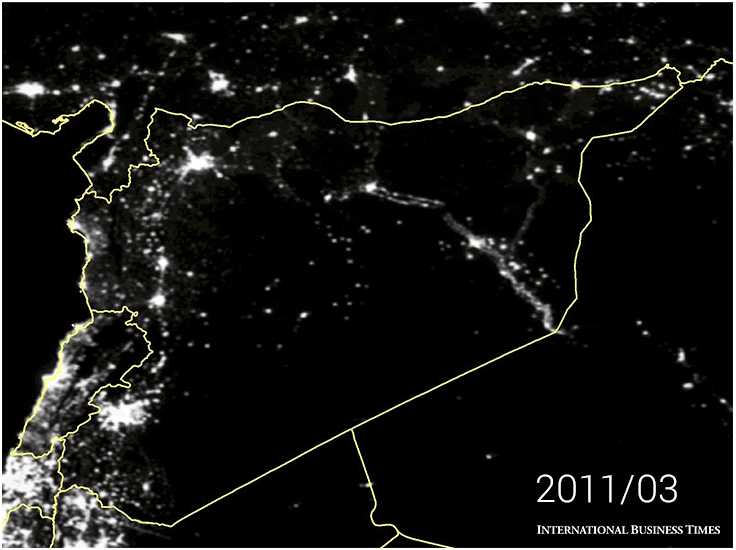Syria in darkness: 83% of lights go out after four years of war

Satellite images have revealed 83% of lights have gone out over Syria in the four years since the conflict began.
Scientists based at the University of Maryland and Wuhan University in China have analysed the images that show the country's descent into darkness over four years of brutal civil war.
The images show in the Islamic State (Isis)-stronghold of Raqqa, as many as 96% of lights have gone out since 2011.
The pictures have been revealed at the launch of a new campaign, #withSyria, by a coalition of 130 non-governmental organisations including the International Rescue Committee (IRC) headed up by former UK foreign secretary David Miliband.
Dr Xi Li, lead researcher on the project, said satellite imagery was the most objective source of data showing the devastation of Syria on a national scale.
"Taken from 500 miles above the earth, these images help us understand the suffering and fear experienced by ordinary Syrians every day, as their country is destroyed around them," he said.
The pictures reveal that in the rebel stronghold of Aleppo, a staggering 97% of the lights have gone out.
In Idlib the figure is 96% while in Homs and Daraa, where the uprising began in 2011 against the regime of Bashar Al Assad, 87% of lights have gone out.
Other areas have fared better, such as the provinces of Damascus and Quneitra, near the Israeli border, where the decline in light has been 35% and 47%.
As well as the images, #withSyria also released a video documentary about the affect of the war on ordinary Syrians.
It coincides with the launch of a petition at withSyria.com that calls on world leaders to "turn the lights back on" by boosting humanitarian efforts, resettlement of refugees and an end to blocks on aid to the country.
"The rise of terrorist groups crossing borders has spread fear and focused the world's attention on Syria - but it has distracted governments from the suffering of ordinary Syrians and the abuses committed by all sides in this conflict," said Dr Zaher Sahloul, president of the Syrian American Medical Society.
"Every day Syrian medics, aid workers and teachers are taking enormous risks to help their neighbours and loved ones, while the international community continuously fails to pursue a political solution and an end to the violence and suffering."
In 2014, at least 76,000 Syrians lost their lives, according to aid agencies, which earlier in March slammed the UN for failing to do enough to help Syrians inside and outside the country.
The Syria crisis "remains severely and chronically underfunded" claimed a report by 21 aid agencies including Oxfam and Save the Children, noting the international aid community will need £5.6bn ($8.4bn) to respond to the crisis. It added funding has gone down from 71% in 2013 to 57% in 2014.
"The bitter reality is that the Security Council has failed to implement its resolutions," said Jan Egeland, secretary general of the Norwegian Refugee Council.
"Parties to the conflict have acted with impunity and ignored the Security Council's demands, civilians are not protected and their access to relief has not improved.".
© Copyright IBTimes 2025. All rights reserved.






















